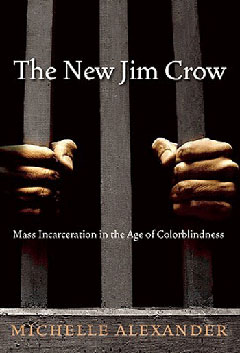The NAACP has just passed a historic resolution demanding an end to the War on Drugs. The resolution comes as young Black male unemployment hovers near 50 percent and the wealth gap's become a veritable gulf. So why is the forty-year-old “War on Drugs” public enemy number one for the nation's oldest civil rights organization? Well here's why: it's not extraneous – it's central: the war on drugs is the engine of 21st century
discrimination – an engine that has brought Jim Crow into the age of Barack Obama. Author Michelle Alexander lays out the statistics — and the stories — of 21st Century Jim Crow in her ought-to-blow-your-socks off book: “The New Jim Crow: Mass Incarceration in an Age of Colorblindness.” I had a chance to sit down with Alexander earlier this summer. We'll be posting the full interview in two parts. “We have managed decades after the civil rights movement to create something like a caste system in the United States,” says Alexander in part one here “In major urban areas, the majority of African American men are either behind bars, under correctional control or saddled with criminal record and once branded as criminal or a felon, they're trapped for life in 2nd class status.” It's not just about people having a hard time getting ahead and climbing the ladder of success. It's about a rigged system. Sound familiar? Like the Pew Research Center report on household wealth and the Great Recession — the NAACP resolution story was a one-day news-blip – despite the fact that it pierces the by-your-bootstraps myth that is at the heart of – you pick it – the deficit, the stimulus, the tax code – every contemporary US economic debate. White America just maybe ought to pay attention. With more and more Americans falling out of jobs and into debt, criminal records are a whole lot easier to come by than life-sustaining employment. Contrary to the conventional media version, the “Drug War” story is not a people with problems story – it's a policing and power story that reminds us that racism's not a figment — and it just might contain a hint or two, too, about what a high-unemployment America could come to look like — for all of us.
Join us in defending the truth before it’s too late
The future of independent journalism is uncertain, and the consequences of losing it are too grave to ignore. To ensure Truthout remains safe, strong, and free, we need to raise $34,000 in the next 72 hours. Every dollar raised goes directly toward the costs of producing news you can trust.
Please give what you can — because by supporting us with a tax-deductible donation, you’re not just preserving a source of news, you’re helping to safeguard what’s left of our democracy.
